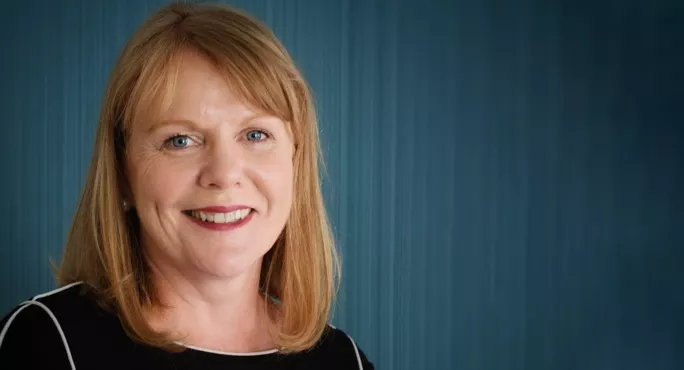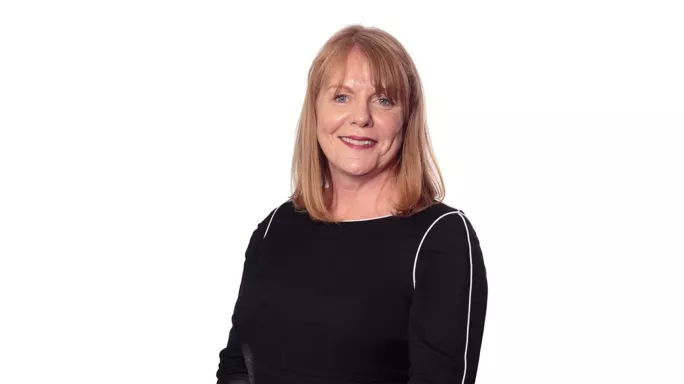- Home
- Meet Jane Hickie: the first female boss of the AELP
Meet Jane Hickie: the first female boss of the AELP

“I’m never going to be Mark Dawe – I’ve got much better taste in dressing,” Jane Hickie laughs.
“When his departure was first announced, there was so much stuff about, ‘Oh my God, how is anybody going to step into his shoes?’ and, ‘Oh my God, what a loss to the sector.' You can take all of that very personally, but actually it's just people saying stuff on social media that they don't need to say.”
Hickie is right: she’s never going to be Mark Dawe –the former chief executive of AELP (the Association of Employment and Learning Providers), who left the organisation in July. But she is going to be Jane Hickie, leading the AELP in her way, with her voice, drawing on her years of expertise.
“A woman has never run AELP before. I wouldn't say that’s a big thing, but it's a big change,” she says.
“I think that's important in the sense that women bring something different to the table. We have a different way of communicating. We have a different way of solving problems. It doesn't mean that we won't get the same outcome in the end, but it's just a different energy.”
Hickie has been at AELP for five years – up until a couple of months ago as chief operating officer. Now she’s running the company as managing director. She says that the role brings together all of her areas of expertise – social mobility, skills and education – and that her friends often joke that she’s the only one who goes to work smiling.
News: New online learning platform to launch in September
More: 6,000 people sign up to Kickstart programme on day 1
Background: Mark Dawe to leave AELP
Hickie was born in Cork, Ireland, and is one of three children. Her father worked for Stanley Tools and her mother looked after the family. Throughout primary and secondary school, she was educated by nuns – and says that she grew up “pretty tough” and with a strong desire to learn.
“Ireland has a very, very good education system. Was it partly fear that forced us to learn? Or did I just have a natural way for learning? I don’t know but you certainly wouldn't go into school without your homework done,” she says.
Helping others to challenge themselves
She says she loved languages at school and studied Irish, Spanish and French. Today, she says her Spanish isn’t fluent but is good enough for getting about. Hickie studied psychology at the University of Cork and self-funded her way through university by working in a factory, vegetable shop and department store.
Hickie says she was unlucky – she graduated from university just as Ireland went into a deep recession. She worked in Ireland for six months before moving to London with two of her university friends.
Her first job here was in a children’s home – which actually had no children living in it but adults with severe mental and physical disabilities. She was a key worker there, and says that the job drained her.
“I learned a lot about mental health and the challenges of that level of care. I take my hat off to people who do that job for all their lives because it was exhausting and I was really young. You would come home at night and you would just be drained,” she says.

However, despite it being exhausting, it was there that Hickie began to discover and foster a key passion: helping others to challenge themselves.
“One of the girls that I looked after in the home, she had very disruptive behaviour, and was heavily medicated. She hadn't been outside for about five years,” she says.
“I started to reduce her medication and take her out and we used to go on bus journeys and she used to act out, but actually she became quite a happy person. I love that kind of stuff where you don’t just challenge yourself but you're also trying to get somebody else to challenge themselves.”
'London is in my blood'
Hickie went on to have a succession of jobs that all had social mobility at their heart: a community relations job at Southwark Council that resulted in unemployed adults in Peckham, South London, getting work placements in the City of London; a programme director-turned-chief executive at West London Leadership, where she bought together a group of professionals who then offered services to the community free of charge; head of regeneration at Genesis Housing Association overseeing stock transfers and ensuring that tenants had an active voice in that process.
Hickie says she thrives on values-driven organisations – “I don't think I could work in a bank,” she laughs.
After 12 years working and living in London, Hickie moved her family – she’s got a son and a daughter – to Cork. Her father had passed away several years earlier, and her mother was very ill and needed looking after. Genesis offered her a sabbatical year – promising her job would be there when she got back. But a year on, when her mother wasn’t any better, Hickie resigned from the role.
She did start working again while living in Ireland – but it didn’t last long. Hickie says she just “couldn’t do it” having been away from the Irish working culture for so long. London, she says, was in her blood.
The family moved from Ireland to Penarth in Wales, where Hickie’s husband had been offered a job. Within the year, Hickie was approached by an old work colleague, offering her a job as an operations director at environmental charity Groundwork UK. Hickie stayed at the charity for six years, before getting a call “out of the blue” from a recruitment consultant about a new role, chief operating officer at AELP.
Hickie says her initial reaction was “to do the thing that all women do”.
“There is evidence that if a woman thinks that she can do 80 per cent of the job, she won't apply for it because she can't do 20 per cent. The brief I had was quite short and I had never particularly seen myself in a role like that,” she says.
“If you had asked me four years ago what I might be doing now, it wouldn't be this – not because I don't love it but because I have been out of the skills sector for so long. But I thought, 'I can learn fast, so why not go for it?'"
The best job she's ever had
Today, Hickie says it’s the best job she’s ever had. She pays tribute to her “fantastic team” and says that she and former chief executive Dawe worked really well together: he gave her the level of autonomy she needed to run the business, and she allowed him to go off and lobby on behalf of the members.
The chief operating officer was a brand new role for AELP – and Hickie says that enabled her to come into her own, shape the role and really make her mark.
“The combination of all of the things that we do at AELP brings together all of those things that I've done throughout my career," she explains.
University or apprenticeships?
“It takes me back to the whole social mobility and education focus. I'm passionate about education – in whatever form that is. If I had my time over, without question, my son would have done an apprenticeship, because university was totally wrong for him. My daughter, on the other hand, who's going into university this year, is absolutely a university candidate. But the thing is you can see the difference in people who should go down one track or another,” she says.
“We tend to push people towards university, and it goes back again to the Baker Clause. I'm really pushing for that to be rolled out fully in schools: people need to know what the options available to them are. When you think about what happened here a couple of weeks ago with A-level students, many of them didn't have a clue about apprenticeships.”
And there’s no doubt about it: over the past six months, the apprenticeship brand has taken a battering. The plight of training providers as apprenticeship starts fell was well documented earlier this year – and Hickie says those problems haven’t gone away.
“Obviously, there is massive concern in some areas, but I think the creativity that has been applied by the sector to being able to keep delivering training has been extraordinary. There are some providers who will be fine and there are some providers who are going to suffer a bit and there are some who suffer a lot,” she says.
“The announcements about Kickstarter and all of those things will have an impact. It’s not especially easy to say how much but what is easy to say is that providers have been through a really rough time and their exclusion by the government from the provider relief scheme was just totally unhelpful.”
But, she says, AELP has come a long way – and today, training providers are valued throughout the sector. Hickie pays tribute to Dawe’s “heavy lifting”, and says her priority now is to build the organisation's services to support the membership so that they have the resources that they need in order to survive and to rebrand.
That doesn’t mean she’s not keeping a sharp eye on the upcoming FE government White Paper – policy will remain a focus, she says, and the lobbying will be just as strong as ever.
“We have very solid foundations from which to work, we've got a very strong board, we've got a very strong team. We’re not slowing down: it's just business as usual. It’s just the personality that has changed.”
Keep reading for just £1 per month
You've reached your limit of free articles this month. Subscribe for £1 per month for three months and get:
- Unlimited access to all Tes magazine content
- Exclusive subscriber-only stories
- Award-winning email newsletters



